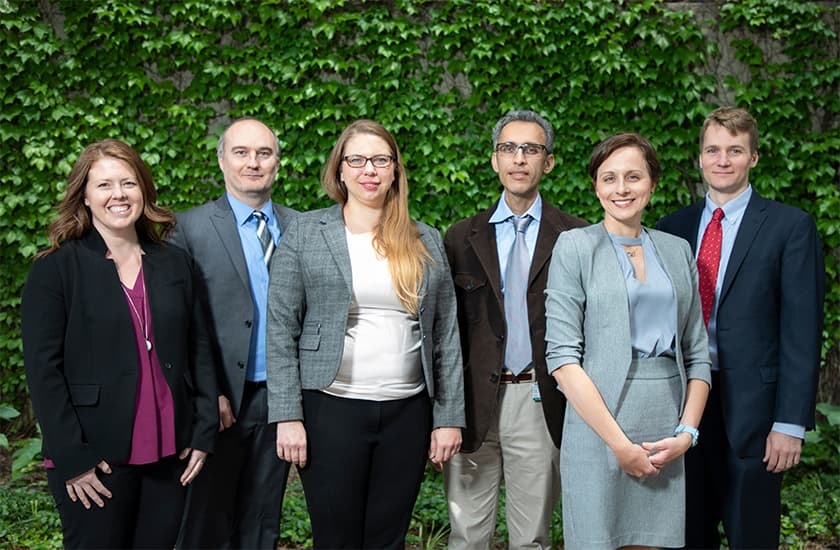Every year the Cohn Family Foundation provides grant support to junior faculty at Rush University who are mentees in the Rush Research Mentoring Program. The Cohn Fellowship allows mentees to gather preliminary data for research proposals and for their continued engagement in research activities.
The following mentees were selected as 2020 Cohn Fellows after a competitive review process:
Dominika A. Winiarski, PhD, is an instructor and postdoctoral fellow in the Department of Psychiatry and Behavioral Sciences. She will become an assistant professor in the department in July 2019 following the completion of her one-year TL1 Fellowship Award through the Institute of Translational Medicine. Her research focuses on improving access to mental health care among homeless and unstably housed youth. She has collaborated with a multisite research team to examine the feasibility of a fully automated cell phone-based mental health intervention for homeless youth in Chicago.
Her Cohn research will expand on her technology-based work to find novel ways of engaging youth to address emotion regulation difficulties. She will also explore the mediating role that emotion dysregulation plays in the relationship between early life adversity and externalizing behavior in high-risk homeless youth.
Faraz Bishehsari, MD, PhD, is an assistant professor in the Division of Digestive Diseases within the Department of Internal Medicine. His research is on the pathogenesis of gastrointestinal malignancies, particularly colon and pancreas cancers, and focuses on how factors in our environment predispose to cancer formation via promoting a chronic inflammatory condition. His Cohn research will examine the potential role of opioid pathways in fibroinflammatory responses in the pancreatic tissue, which could lead to the formation and progression of pancreas cancer.
Kevin C. Jones, PhD, is a medical physics instructor in the Department of Radiation Oncology. His research focuses on developing novel imaging techniques to guide radiation therapy delivery. His Cohn research will help him build and characterize an X-ray imaging system to track lung tumor positions during radiation treatment.
Kristen Haut, PhD, is an instructor in the Department of Psychiatry and Behavioral Sciences. She will become an assistant professor in the department in July 2019. Her research aims to promote behavioral health and reduce the burden of chronic psychiatric disorders by identifying disrupted neural connections and developing treatments designs to alter these neural functions.
Her research uses functional and structural neuroimaging to evaluate cognitive training interventions in people with schizophrenia and bipolar disorder, and people at risk for psychosis. Her Cohn research will focus on testing a newly developed computerized training paradigm addressing cognitive control of emotion in people with recent-onset bipolar disorder. The goal is to measure structural changes in the underlying neural network.
Lauren M. Little, PhD, OTR/L, is an assistant professor in the Department of Occupational Therapy. Her research focuses on innovative service delivery models for families of young children with developmental conditions, including autism spectrum disorders, or ASD. Her Cohn Fellowship leverages funding from the American Occupational Therapy Foundation to expand a telehealth intervention aimed at increasing adaptive behavior (i.e., toilet training, mealtime behaviors) among children with ASD. Specifically, her work will test the efficacy of individualized versus group-based services delivered online.
Lionel C. Clement, PhD, is an assistant professor in the Department of Internal Medicine. He is studying the role of Angiopoietin-like 4, or ANGPTL4, and proprotein convertase subtilisin/kexin type 9, or PCSK9, in animal models of human kidney diseases. He showed that ANGPTL4 plays opposite roles in kidney disease depending of which organ it is secreted from, and it is implicated in the development of high levels of plasma triglyceride during the development of the disease. His Cohn research will study the role of PCSK9 expressed in the kidney in the initiation of hypercholesterolemia in kidney disease.

